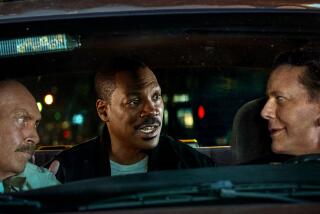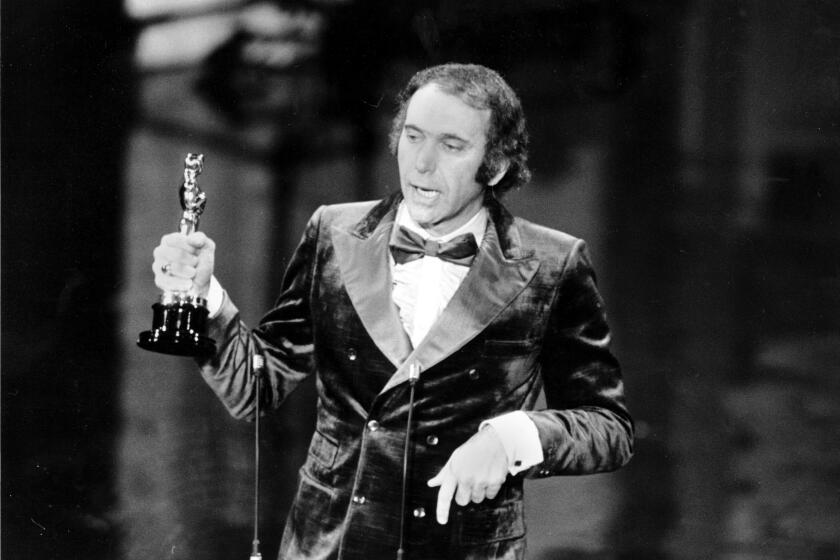Well, You See, Doctor, It’s My Family. ..
One of the great comic moments in David O. Russell’s 1996 film “Flirting With Disaster” comes when Ben Stiller informs his adoptive mother that he’s going off to meet his birth parents. His mother, a chain-smoking neurotic played by Mary Tyler Moore, takes it badly.
“[You’re] saying we failed completely,” she tearfully exclaims, dabbing her eyes with Kleenex.
“No,” Stiller replies. “That’s way too extreme.”
“Maybe 40%,” Moore says bitterly.
“Mom, you can’t quantify it like that,” says Stiller, trying to be reassuring. “What difference does it make if it’s 40% or 60%?
Moore bursts into tears. “60%!”
However exaggerated, the scene always gets a big laugh because it hits so close to home. In films about dysfunctional families, a genre currently enjoying a healthy revival, it’s often exaggerated behavior that best captures dramatic truth.
“Family is a universal topic, because it’s stuff you’ve dealt with your whole life,” says Bart Freundlich, the 27-year-old writer-director of the just-released “The Myth of Fingerprints.” “There’s so much complexity and so many layers there that you can always find a story, whether it’s drama or comedy. And it’s always fresh, because what you’re really doing is writing about the things people don’t say in their own lives.”
Family has been one of the most enduring subjects in film, both for dramas like “East of Eden” and “The Godfather,” as well as comedies like “You Can’t It Take It With You” and “The Birdcage.” Right now the theaters are full of movies that explore troubled family relations, with more to come. Consider the following:
* “Soul Food,” a film from first-time writer-director George Tillman Jr., about a tightly knit African American family whose Sunday-night dinners become an emotional battleground.
* “The Ice Storm,” a cold-eyed account by director Ang Lee of an uptight suburban Connecticut family coming to grips with the sexual revolution of the Nixon years.
* “A Thousand Acres,” directed by Jocelyn Moorhouse, offers the turbulent tale of a crusty patriarch and his extended family, who are torn asunder by long-buried sexual transgressions.
* “The Myth of Fingerprints,” where first-time director Freundlich chronicles the tense drama that unfolds at an uneasy Thanksgiving family reunion at a country home in Maine.
* “The House of Yes,” due out Oct. 10, an outrageous dark comedy from first-time director Mark Waters about a crazy family with secret desires and an unhealthy fascination with the Kennedy assassination drama.
Though the movies use Sunday dinners and holiday gatherings as the setting for family turmoil, they’re decidedly not G-rated fare. In fact, most of the movies crackle with highly charged sexual antics, taking the form of adultery, wife swapping, teen lust, incest and child abuse. Fathers seduce daughters, brothers sleep with sisters, every fiancee or husband seems to be fair game.
After having sex with her next-door neighbor’s spouse in “The Ice Storm,” Sigourney Weaver gives him the cool brushoff: “I have a husband, I don’t particularly feel the need for another.”
Far more adult than today’s typical studio fare, most of these films are low-budget, independently financed projects, whose firepower is provided by emotional tumult, not special-effects explosions.
“You can’t really make a movie with an epic sweep on $1.5 million,” says “House of Yes” director Waters, who grew up in an Irish Catholic family in South Bend, Ind. “But the family gives you a whole world of emotion in a small space. Families are a built-in drama box. They offer you a closed environment, with all these layers of emotion that’s just perfect for a filmmaker working on a low budget.”
Not all the stories are based on personal experience. Adapted from a Jane Smiley novel, “A Thousand Acres” borrows its central premise--a Corn Belt patriarch giving his land to his three daughters--from Shakespeare’s “King Lear.” But in many instances, family memories provided the spark for much of the action and character development.
Tillman says his film, which revolves around Sunday meals prepared by Mother Joe and her three grown daughters, was inspired by his boyhood memories of Sunday family dinners in Milwaukee prepared by his grandmother and her six daughters. (A portion of the film’s $6.5-million budget went to the food stylist who cooked the sumptuous meals seen in the picture as the cast worked on a nearby stage.)
“I used to hate those big dinners--I’d ask my dad why I had to hang around all these women,” recalls the 28-year-old director. “But that’s where the film comes from--my aunts cooking in the kitchen, my dad and my uncles in the next room, watching the Packer games, talking about my aunts.
“When I sent the script to my younger brother, he said, ‘Hey, this is us!’ My aunts have all been asking, ‘Am I Vanessa? Am I Vivica Fox?’ And I’m not telling them anything.”
Freundlich’s own family is small--he only has one brother--while his film depicts a Thanksgiving family gathering with four grown children, plus several spouses and girlfriends. Nonetheless, he sees plenty of similarities. Freundlich has been in therapy for years, as has his male lead character, played by “ER’s” Noah Wyle. His family spent weekends at a country house in Long Island, not unlike the one in his film.
“I knew what it was like to be trapped in a house, alone with the family for the weekend,” he says. “The challenge was drawing on all of the subconscious behavior that you don’t even notice going on, much less understand. I saw an old friend recently who reminded me how terrible our family dynamics were for him. He said, ‘I’d end up in the living room, alone with your parents, while you were locked in your room, watching the Knicks game.’ ”
Many of the actors identified with the material as much as the directors. Freundlich says Wyle especially connected with the script because it dramatized events similar to ones in his life. Tillman says Vanessa L. Williams, who co-stars with Nia Long and Vivica A. Fox as the three sisters in his film, also was reminded of things she’d experienced in her life. “Everyone saw something,” says Tillman. “Vanessa had a grandmother a lot like Mother Joe. Nia was really reminded of people from her family. That’s the thing about family, it’s universal.”
When Waters cast “The House of Yes,” his first choice for the lead role was Parker Posey, who plays a glamorous but unstable beauty whose infatuation with her twin brother is threatened when he brings his fiancee home for Thanksgiving dinner. The idea of twins had resonance both with Waters, whose mother has a twin brother, and Posey, who has a twin brother. “Parker gave the part an incredible, Katharine Hepburn-like swagger,” Waters recalls. “I think the role was really cathartic for her, because she got to work out all sorts of emotional issues she’d had with her own brother.”
The dark comic tone of “The House of Yes,” which Waters adapted from a play by Wendy MacLeod, reminded him of his own family dynamic. “The characters have this mordant black humor--joking about the real issues instead of talking about them--that is just the way it is in my family,” says Waters, whose older brother, Dan, is a successful screenwriter, best known for scripting “Heathers,” a popular 1988 black comedy.
“Dan and I hide behind our language too. He’ll call me up and say, ‘Hey, scumbag, wanna go see a movie?’ And I’ll say, ‘Why would I want to go with you, you dumb [expletive].’ It’s the tone we use that makes it easiest to relate to each other.”
Much of the drama in the current crop of family films derives from competitiveness, which surfaces in sibling rivalries, parent-child conflicts, sexual tension and economic envy. In most families, squabbles and fights are a primary form of communication, making them fertile ground for any filmmaker.
“Every family has its rituals,” says Waters. “Ours were games--Pictionary, Taboo, Scrabble. That’s when things would get wild, because all the unresolved stuff would come out. We’d be playing a game and before you knew it, everyone was shouting. Gentility went out the window. My brother once knocked me over a couch. To us, playing a board game was like touch football.”
Although “Soul Food” draws heavily from Tillman’s family experience, he says he drew on many elements from “Avalon,” Barry Levinson’s account of the disintegration of his family. He even screened clips from “Avalon” for his cast before he began filming. Both films can be seen as cautionary tales about the loss of tradition.
“His family fell apart because of the suburbs and TV,” says Tillman. “With my family, it was jealousy, infidelity and our elders passing on. But while I’m proud to have made a film with a positive ending, you got to show it the way it is. The scene that gets the biggest response from women is when Vanessa’s husband has betrayed her and she goes after him with a knife. The women go crazy, because they know it’s real.”
With families, the more things change, the more they stay the same. Freundlich says he could have written a half-dozen different scripts, each with the same characters and troubled relationships.
“We always retreat into the same roles,” he says. “When my parents came to my house for Christmas, I thought it would all be different, because I was now an adult. But the same things started happening--my mom helped with the cooking and my father watched a game on TV. And I realized that no matter how far away you run from your family, you can never completely get away. I just hope we’re making a little progress.”
More to Read
Only good movies
Get the Indie Focus newsletter, Mark Olsen's weekly guide to the world of cinema.
You may occasionally receive promotional content from the Los Angeles Times.






